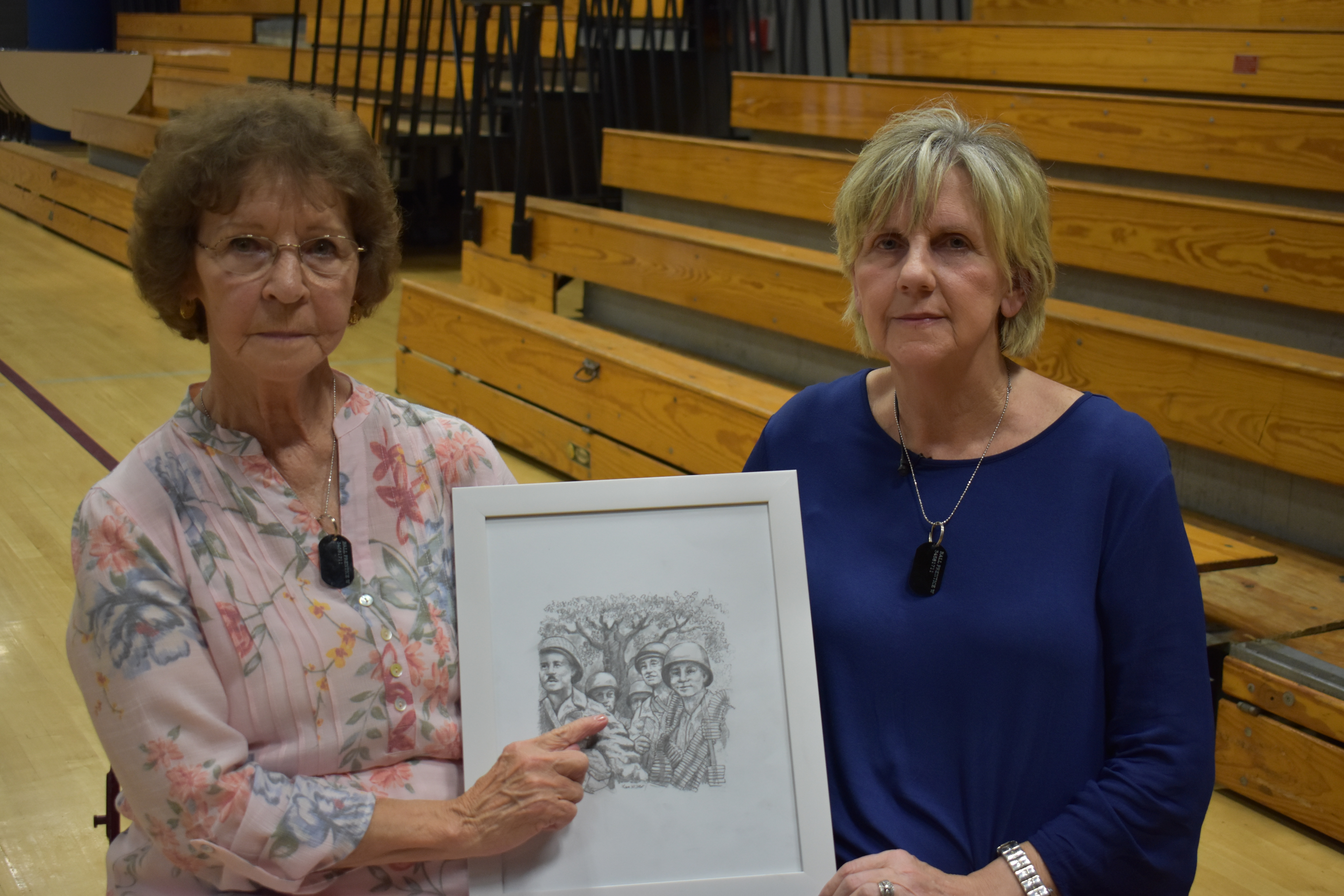Prentice Ball’s daughters Jo Ann Dempsey, left, and Sheri Mize, right with a drawing of their father. Ball’s pocket knife, lost in a World War II foxhole in Germany in 1945, was returned to his family at a special ceremony on Sunday, May 20, 2018 at West Point High School. (Heather Mann for The Tribune)
WEST POINT – On Easter Sunday, Ronald van Meesen was pursuing his pastime of metal detecting World War II sites around the town of Alpen, Germany when he stumbled upon the remains of an American foxhole. In it, he hit on and dug up a pocket knife inscribed with a name and hometown: “Prentice W. Ball” and “Vinemont Alabama.” On Sunday, just seven weeks later, Footsteps Researchers (FR), the company that handled the find, returned the knife to Ball's family in a ceremony at West Point High School.
Ball, who passed away in 1983, had three daughters: Jo Ann Dempsey, Sheri Mize and Jean Gilbreath; Dempsey and Mize were presented with their late father’s knife at the event.
Dr. Myra Miller, with the St. Louis FR office, led the ceremony in West Point. Miller introduced two other team members who worked on the project: Sara Collins, the genealogist who traced the information on Ball's knife to his family here in Alabama, and Joey van Meesen, the lead researcher for the European sector of FR, whose father found the knife.
Miller described the process of finding Ball’s family and returning the knife.
"We wanted to make sure we were 100 percent positive we had the right guy," she explained. This required finding the file on Prentice W. Ball in the national WWII archives in St. Louis (there were dozens of people with the last name Ball, three of whom were named Prentice), checking the morning reports, and confirming that he and/or his unit were in the area where the knife was found. Once all that was confirmed, FR started putting together a combat narrative package, which detailed not only the finding of the knife, but also the precise movements of Ball's unit, the return process, and documents from Ball's file ranging from dental records to his honorable discharge papers. An excerpt from the narrative read, "The 30th Infantry Division was put on a secret list, and the first battalion moved on the night of March 18th to the assembly area southwest of Wesel on the Rhine River. Prentice W. Ball's pocket knife was found in this area, south of the town of Alben."
Ball served in Company A, 117th Regiment, 30th Infantry Division in the U.S. Army during the division’s post-D-Day campaign through France and Germany in 1944 and 1945. Between March 18 and 25, 1945, the 117th Regiment was encamped in Alpen.
FR confirmed that the knife was dropped on the night of March 23, 1945.
The cover of the package featured a drawing based on a picture of Ball's unit (the original picture was also included in the package), which was done by Miller's brother. Her brother did a second drawing of the picture, which was framed while the other went with the package; both of these were given to the family before the knife was presented, as well as replica dog tags with Ball's name and serial number (created by Collins) and a jump drive detailing Ball's footsteps.
The knife was presented by Collins to daughters Dempsey and Mize. Mize thanked Miller, Collins and Joey van Meesen for everything they did to bring her father's knife back, saying how much it meant to the family to have a piece of him back. Dempsey and Dr. Miller let everyone have a chance to come up and see the knife, and then the family gathered together to get some group pictures with it; first the immediate family (the children, grandchildren, and so on), then the extended family with cousins and in-laws. Later, when the excitement died down a bit, Mize and Dempsey sat down for an interview with ABC 33/40 and The Tribune.
The sisters described their father as a good, loving man. "He didn't drink, didn't smoke, didn't cuss," said Dempsey." He was a very good man."
Mize said, "He served his country. He always made sure his family had what they need. He was very active in the church, and he treated everybody the same."
Dempsey added that Ball almost never talked about his time in the war, to the point where they were unsure as to how long he served. Mize said that he also rarely lost things, so the fact that he lost his knife and it was returned to them meant so much more.
The sisters recounted that they were overjoyed when they first heard of the knife being found. "I think I've used about every word that there is," said Mize. "Amazing, unbelievable, just incredible."
Dempsey recalled seeing the photo of the knife for the first time and recognizing her father's handwriting. They both expressed extreme gratitude for Miller and her team – gratitude for these strangers going so far out of their way to do this for them, saying that if anybody else had found that knife then the family might never have gotten it back.
When asked what having the knife back in the family means, the sisters jokingly said that it means more family fighting over who gets to have it, which they feel their father wouldn't have approved of. "He would've said, 'Put it up and hide that rusty blade.' But also, 'I remember that night.'" There aren't any official plans set for the knife's future, so everyone in the family will get to hold on to it for a little while. The entire family, some of whom drove hours to be at the ceremony, will get their chance to remember PFC Prentice W. Ball and celebrate his legacy.
For more information about Footsteps Researchers and their current projects, visit http://footstepsresearchers.com.
Copyright 2018 Humble Roots, LLC. All Rights Reserved.



























